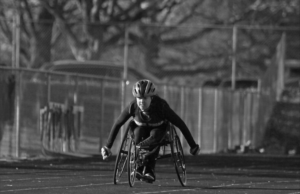CF public transport resists discriminatory trend

Compared to other cities more than twice its size, Cedar Falls has a few less barriers for disabled people attempting to access public transportation. Local taxi cab companies such as Dolly’s Taxi do not charge disabled patrons a luggage surcharge for transport of their mobility assistance devices regardless if they use the wheelchair/stretcher service or non-adapted cabs. They also charge the same basic fares for both services for all customers. In many major cities like Chicago or New York City (even though it is illegal), this surcharge is customary for many disabled patrons.
In these cities, it is also customary that disabled patrons call days to weeks in advance in order to ensure basic accommodation, although equal and safe access is already legally mandated by the Americans With Disabilities Act; whereas, able-bodied patrons can take any mode of transportation they please: metro, city bus, cabs with little to no prior contemplation or extra charge.
In the past few years there have been many lawsuits over lack of accessibility and the (illegal) surcharge, one of the most prominent being the case of Access Living of Metropolitan Chicago and Uber. The popular cab service was sued on grounds of “insufficient adaptation.” Uber provided nearly two million rides in Chicago in June of 2015 alone. Only 14 of those rides were accessible to motorized wheelchair user patrons.
The company has previously stated that it should be exempt from the ADA due to the fact that it is not a cab corporation, but instead is merely an app service for cheap and quick transport. Uber has since attempted to abridge its statement by educating drivers in regard to legislature in the transportation of service dogs, providing no information regarding legal obligation of appropriate transportation for users of mobility assistance devices. The company has never admitted to breaking the law or violating Title II of the ADA.
In a world where technology is drastically changing the way people function, including the ways in which people commute, equal access should be at the forefront of modernization. It has been 27 years since the Americans With Disabilities Act has been passed, and today, even though some accommodations bear the blue accessibility sticker, that doesn’t necessarily mean that these public spaces are “accessible.”
Approximately 5.67 million Americans have some form of disability, or one out of every five people. Disabled people within the United States are twice as likely to live in poverty than an able bodied citizen, and, on average, only one in five disabled adults is employed due to a lack of a niche job market.
The process of becoming certified to drive while disabled is a lengthy and economically straining one. Average sessions with a specially trained occupational therapist to teach drivers how to properly use their adaptations cost between $100-$200 apiece. The average driver needs six to 12 sessions in order to become comfortable and fluent with the adaptation, and most insurances consider this an “unnecessary luxury charge,” so all sessions are usually paid out of pocket. The average adaptation for a driver who is a wheelchair-user costs between $3,000 and $10,000, which is also not covered by insurance. There are charities that can cover some of the cost, like Vocational Rehab, but their services come with terms and conditions. The most common of which, having to be in high school to obtain assistance. This can result in the potential driver not getting their licence until the age of 18 or older, leaving them significantly behind their able bodied peers.
Therefore, many disabled people rely upon public transportation due to other ableist barriers. Metro, subways, city bus and cabs are all vital to independence and functionality. Former CFHS graduate Megan Hermanson, who relies upon public transportation to get to occupation due to her disability, said “I like not having to rely on my parents. [If I did not have the city bus], it would be inconvenient for my parents and I would feel less independent.”









You must be logged in to post a comment Login